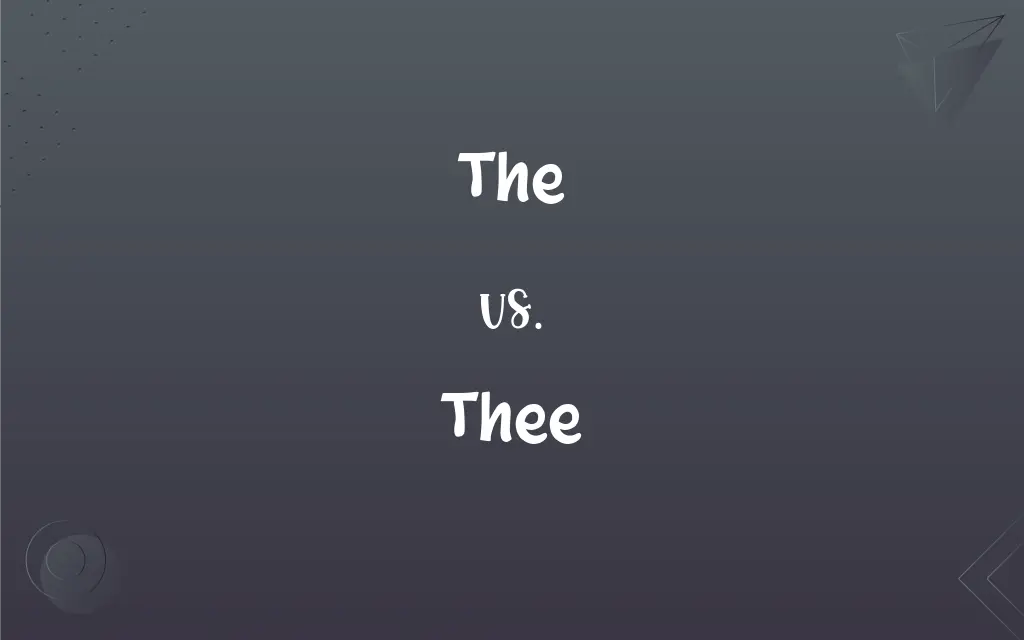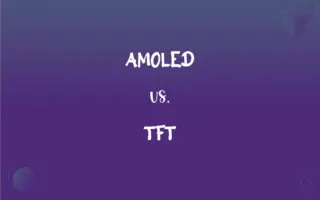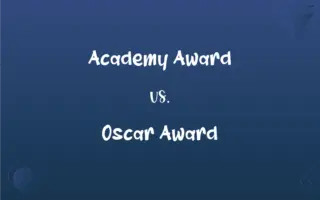The vs. Thee: What's the Difference?
Edited by Aimie Carlson || By Harlon Moss || Published on February 22, 2024
The is a definite article used before nouns. Thee is an archaic or poetic term for 'you' in the objective case.

Key Differences
"The" is a definite article in English, used to refer to specific nouns that are already known to the listener or reader. "Thee," on the other hand, is an archaic second person singular pronoun used in the objective case, equivalent to the modern "you."
"The" is used universally in contemporary English and precedes both singular and plural nouns. In contrast, "thee" was predominantly used in older forms of English and is now mostly found in religious texts, classic literature, and poetry.
"The" does not reflect the number or gender of the noun it precedes, serving only to specify the noun. "Thee," however, was specifically a singular pronoun, used to address one person in a formal or poetic context.
In modern usage, "the" is an integral part of everyday speech and writing, found before common and proper nouns. "Thee" is now considered archaic and is rarely used in ordinary conversation or writing.
"The" has no variants in English and is invariant in form. In contrast, "thee" was part of a system of pronouns that included "thou" (subjective), "thy" (possessive), and "thine" (before a vowel sound).
ADVERTISEMENT
Comparison Chart
Function
Definite article for nouns
Archaic objective case for 'you'
Usage
Universal in modern English
Rare, mostly in archaic or poetic text
Number and Gender
Invariable, used for any number or gender
Singular, no gender distinction
Context
Everyday speech and writing
Formal, religious, or poetic context
Variants
No variants
Part of a system with 'thou', 'thy', 'thine'
ADVERTISEMENT
The and Thee Definitions
The
"The" can be used with adjectives to form noun phrases.
He is the best player on the team.
Thee
"Thee" was used in older English and is now found mainly in religious texts.
Blessed art thou among women, and blessed is the fruit of thy womb.
The
"The" is used to refer to a specific noun that is known to the listener or reader.
I saw the movie you recommended.
Thee
"Thee" is rarely used in modern conversation, mostly appearing in historical or religious contexts.
Hear me, O Lord, and bless thee.
The
"The" is used with superlatives and ordinal numbers.
She finished the race in the first place.
Thee
"Thee" is an archaic or poetic form of 'you' in the objective case.
I bring this gift for thee.
The
"The" precedes nouns that are unique or already mentioned.
The sun sets in the west.
Thee
"Thee" is associated with formal or poetic expressions.
To thee, my heart is given.
The
"The" is the only definite article in English.
The Nile is the longest river in Africa.
Thee
"Thee" was part of the traditional English pronoun system, including 'thou', 'thy', and 'thine'.
I have always loved thee, my dear friend.
The
To that extent; by that much. Used before a comparative
The sooner the better.
Thee
Objective and reflexive case of thou.
Thee
Thou.
Thee
(transitive) To address (a person) using the pronoun thee.
Thee
(intransitive) To use the word thee.
Thee
To thrive; prosper.
Thee
The letter ⟨(⟩, which stands for the th sound lang=en in Pitman shorthand.
Thee
To thrive; to prosper.
Well mote thee, as well can wish your thought.
Thee
The objective case of thou. See Thou.
This sword hath ended him; so shall it thee,Unless thou yield thee as my prisoner.
FAQs
Can 'the' be used with plural nouns?
Yes, 'the' can be used with both singular and plural nouns.
Where do we commonly find 'thee' used?
'Thee' is mostly found in religious texts, classic literature, and poetry.
What is 'the' primarily used for?
'The' is used as a definite article before specific nouns.
Is 'thee' still used in modern English?
'Thee' is rarely used in modern English, mostly in poetic or religious contexts.
Can 'the' be omitted in English?
'The' can sometimes be omitted, but it often provides clarity and specificity.
Why do we see 'thee' in old texts?
'Thee' was a standard part of the English pronoun system in earlier periods.
Is 'the' used in every English-speaking country?
Yes, 'the' is used universally in all English-speaking countries.
Does 'the' change form based on gender or number?
No, 'the' is invariant regardless of the gender or number of the noun.
How is 'the' pronounced differently?
'The' is pronounced as 'thee' before a vowel sound for easier pronunciation.
What is the modern equivalent of 'thee'?
The modern equivalent of 'thee' is 'you.'
In what context was 'thee' traditionally used?
'Thee' was traditionally used in formal or religious contexts.
Was 'thee' used in everyday conversation in the past?
Yes, 'thee' was commonly used in everyday conversation in older forms of English.
Why is 'thee' considered archaic?
'Thee' is considered archaic because it is no longer used in modern English.
What is the role of 'the' in English grammar?
'The' plays a crucial role in specifying and defining the noun it accompanies.
Is 'thee' still taught in schools?
'Thee' is taught in the context of historical or literary studies.
Is 'thee' used in modern poetry?
'Thee' can be used in modern poetry for a stylistic or archaic effect.
Does 'the' have any synonyms?
'The' does not have exact synonyms as it is the only definite article in English.
How does 'the' affect the meaning of a sentence?
'The' specifies and gives particularity to the noun it precedes.
What are the variants of 'thee'?
The variants include 'thou' (subjective), 'thy' (possessive), and 'thine' (before a vowel).
Can 'the' be used with proper nouns?
'The' can be used with proper nouns when they are unique or specified.
About Author
Written by
Harlon MossHarlon is a seasoned quality moderator and accomplished content writer for Difference Wiki. An alumnus of the prestigious University of California, he earned his degree in Computer Science. Leveraging his academic background, Harlon brings a meticulous and informed perspective to his work, ensuring content accuracy and excellence.
Edited by
Aimie CarlsonAimie Carlson, holding a master's degree in English literature, is a fervent English language enthusiast. She lends her writing talents to Difference Wiki, a prominent website that specializes in comparisons, offering readers insightful analyses that both captivate and inform.







































































